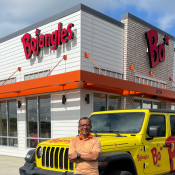Three Reasons Why Brand Adaptability Is More Important Than Ever
3 Min Read By Marco Acevedo
The restaurant industry has been hit hard by the pandemic, but many businesses are beginning to bounce back. To recover, brands have evolved and made effective changes to meet the continuous challenges, making an impact at the corporate level while providing operators with the necessary tools to be successful. At Bojangles, it became apparent that old tactics were no longer enough, and we needed to change our approach. To offer operators more support than before, we introduced new technology, prioritized omnichannel strategies, implemented a more personalized training and operations system, and adjusted our franchisee support. As we pivot our strategy, we tend to ask ourselves – why is adaptability so important?
Optimizing Your Business
It’s no secret that we are a part of an ever changing, complex industry. This became even more evident throughout the pandemic as business models and many consumer preferences shifted. While challenging, the pandemic required brands to reevaluate current practices and modify as needed to optimize operations and help franchisees survive. At Bojangles, we recognized a need to improve areas of our business to help our operators succeed. Some of these changes included:
- Advancing technology to offer guests exceptional delivery options as well as more complete access to the brand’s customer app.
- Launching industry-leading human resource departments to enable a more positive experience for operators and staff.
- Evolving supply chain support, which includes direct negotiations with suppliers to ensure both quality and safety across all locations.
- Enhancing marketing tactics to stand out and attract new consumers.
- Building hands-on real estate committee to advise operators and help select the best location at the best price.
Crisis situations often give brands an opportunity to take a step back and evaluate what’s working and what needs to be changed. As we progress forward, it’s imperative that our industry remain adaptable and open to optimization, as we’re sure to face additional challenges in the months and years ahead.
Brand Accessibility Is Key
Recognizing a need for change shows your corporate team and franchisees a dedication to doing what’s necessary to overcome challenges. Keeping the faith of your team and existing franchisees, while showcasing adaptability to prospective operators will help the brand grow and excel. At a moment’s notice, brands had to develop strategies to help franchisees navigate pandemic complexities, which is not an easy thing to do. To meet evolving consumer preferences, some brands have had to completely change their business model, while others ramped up off-premise, reworked menu strategy or evolved their tech capabilities.
At Bojangles, we recognized our customers’ desire for brand accessibility, and shifted our focus to creating the most seamless, convenient and effortless guest experience. As a result, we improved our app, enhanced our tech focus and dug into omnichannel to allow our guests to access our brand how they wanted and when they wanted, while ultimately driving sales during such an unprecedented time.
It’s imperative that brand leaders continuously apply changes to make the brand more accessible. Foodservice concepts that make it easier for their guests to access and frequent the brand are the ones that are going to come out on top.
Setting Employees Up for Success
In such a competitive, fast-paced environment, you have to remain open to change, but remember that adaptation will require – in many instances – your frontline workers to learn new systems and operations. Without a well-trained staff, your brand is sure to fail and each location is a representation of the broader system.
We recognized a need to introduce a new, revamped support strategy, which consisted of more personalized and enhanced training. We started sending our support teams to newly franchised locations for immersive in-person staff and management trainings, in-house product testing, development training practices and more. Following that initial training, we continued to refine each operators’ specific support strategy based on their individual needs, and maintained a close, transparent, communicative relationship with them as they continued to grow with the brand. By making relevant, constructive changes, you’re able to strengthen your brand, while adapting to changing business environments, which will ultimately lead to further growth and profitability.
Change can be frightening, but it’s remarkable how our industry has adapted with the challenges thrown our way. As we progress, brands will have to remain open to change to successfully optimize their businesses, make their brands more accessible and ensure their staff is prepared. We can’t control every challenge we face, but we can control our response.


